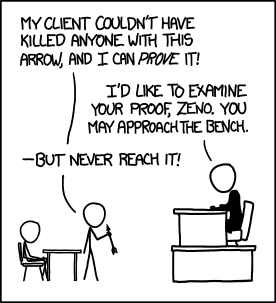Proof

The prosecution calls Gottfried Leibniz.

The prosecution calls Gottfried Leibniz.
Zeno of Elea was an ancient Greek philosopher who devised several apparent paradoxes of motion called Zeno's paradoxes. Here are the two relevant to the comic:
- Arrow paradox: At any instant in time, an arrow suspended in mid-air is no different from an arrow in motion. How, then, can motion occur? (Answer: calculus [all objects have a velocity].) The lawyer presumably intends to use this argument to prove that his client could not have used the arrow to commit murder. Another possibility was that it is impossible to hit a person in motion.
- Dichotomy paradox: Suppose I need to go from point A to point B. First I must walk halfway there: half of the distance between A and B. Then I must walk half the remaining distance, which would bring me to three-quarters of the original distance; then I must again walk half the now-remaining distance to reach a point seven-eighths of the way from point A, and so on. Because I would have to take an infinite number of non-zero steps, I will never reach point B. By the same argument, the lawyer in the comic can get closer and closer to the judge's table, but never reach it.
There are two possible law vs math/logic puns in the comic, on the words "approach" and "proof." "Approach the bench" is a legal term meaning to have a private conversation with the judge; approach in calculus means an infinite process where a function value gets closer and closer to a limit value that it never actually reaches, reminiscent of Zeno's paradoxes. "Proof" is also ambiguous, with a different meaning in formal mathematics than in jurisprudence. See Proof (truth) and Mathematical Proof, for example.
Gottfried Leibniz is the co-inventor of calculus (along with Isaac Newton; see 626: Newton and Leibniz). If Leibniz were to testify in this imaginary trial, he might argue that calculus invalidates Zeno's paradoxes, because the moving arrow has a different velocity than a stationary one (the function describing the motion has a nonzero derivative at the point), and the infinite series in the dichotomy paradox has a finite sum. Both Zeno and calculus assume a continuous, infinitely divisible, ideal spacetime (as does quantum mechanics); a different solution would be available if spacetime turns out to be discrete. However, Zeno is arguably not concerned with actually calculating the correct answer. In the real world, Zeno can be trivially disproven simply by moving and reaching a desired target (it is said that Diogenes the Cynic reacted to the paradox by wordlessly walking from one side of a room to the other, to demonstrate his contempt for it). It remains a question of debate whether a mathematical approach addresses the central points in Zeno's arguments.
994: Advent Calendar is also about Zeno.